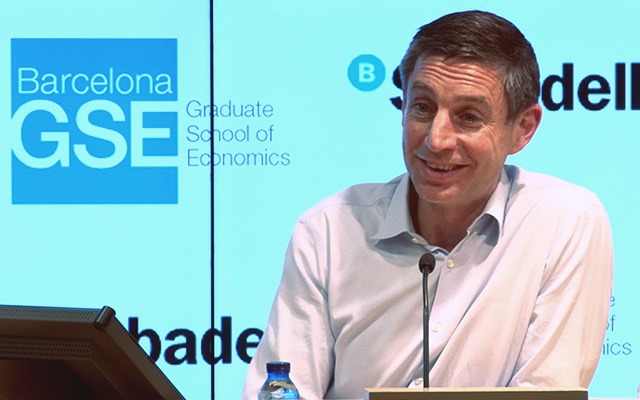research
Michael Greenstone delivers 36th BSE Lecture

The director of the Energy Policy Institute at the University of Chicago and former Chief Economist to President Obama's Council of Economic Advisers presented the 36th BSE Lecture, "The Global Energy Challenge" at Banc Sabadell on November 17, 2016.
Before the lecture, Banc Sabadell's Head of Macroeconomic Research, Sofía Rodríguez, noted that the topic is particularly relevant in the current global context. "The challenge for dealing with global warming is that it requires two factors...coordination between all countries, and long-term thinking. [Both factors] are increasingly scarce in the current political and economic arenas," she said.
In his introduction of Professor Greenstone, Albert Banal-Estañol (UPF and BSE) mentioned his papers on the Clean Air Act in the United States and recent influential work on developing economies in China and India. "He focuses on the cost and benefits of environmental quality. He has studied extensively the choices we make as a society in terms of energy," Prof. Banal-Estañol said.
Video: Lecture recap
Balancing energy and growth
In his talk, Prof. Greenstone illustrated seven facts that explain the difficult balance between energy and growth:
- Energy is critical for growth
- Energy access is a major problem
- Demand will grow rapidly in developing countries
- Fossil fuels are expected to meet much of this growth
- Fossil fuels increase pollution that shortens lives
- Fossil fuels are causing the complicated climate challenge
- The Paris Agreement is expected to help...some
Professor Greenstone then described three key solutions to the global energy challenge:
- Price energy at its full social cost
- Invest in innovation
- Identify effective policy tools
"The global energy challenge may be the more important one for human well-being," Prof. Greenstone said. "The challenge is how to navigate and balance between the goals of access to inexpensive and reliable energy while not leading to air pollution and other environmental problems that compromise human well-being today, and simultaneously not exposing ourselves to disruptive climate change."
